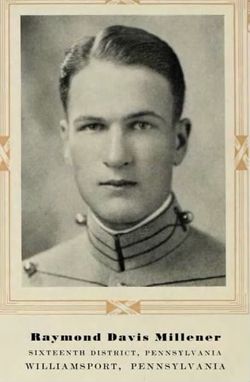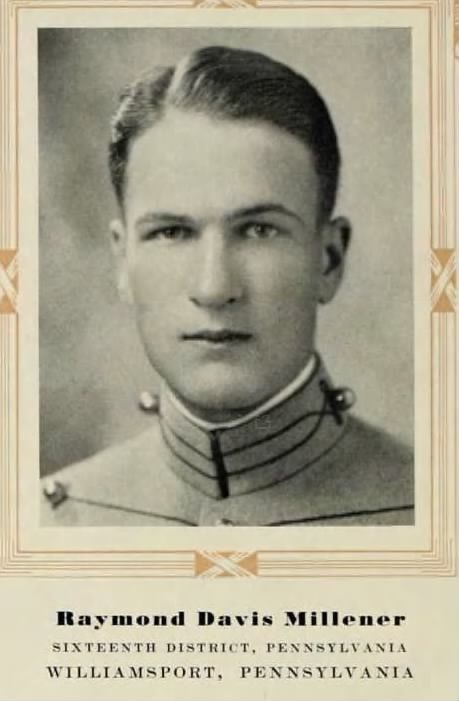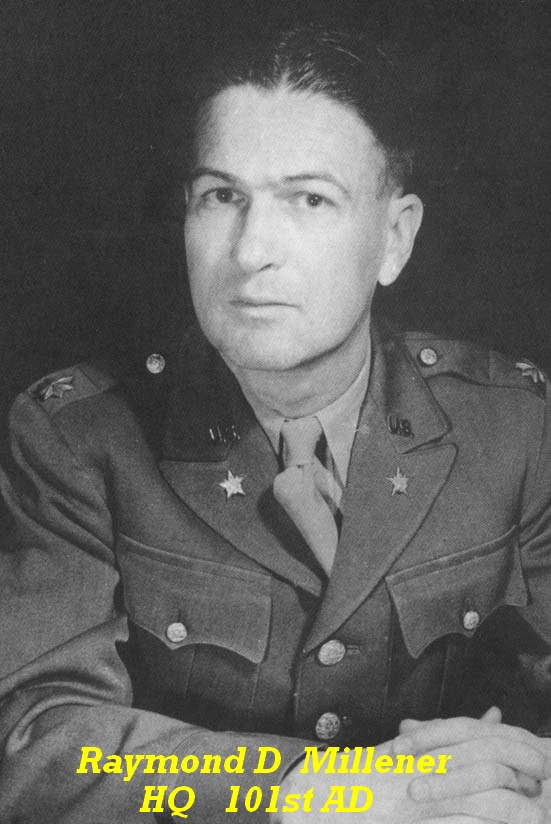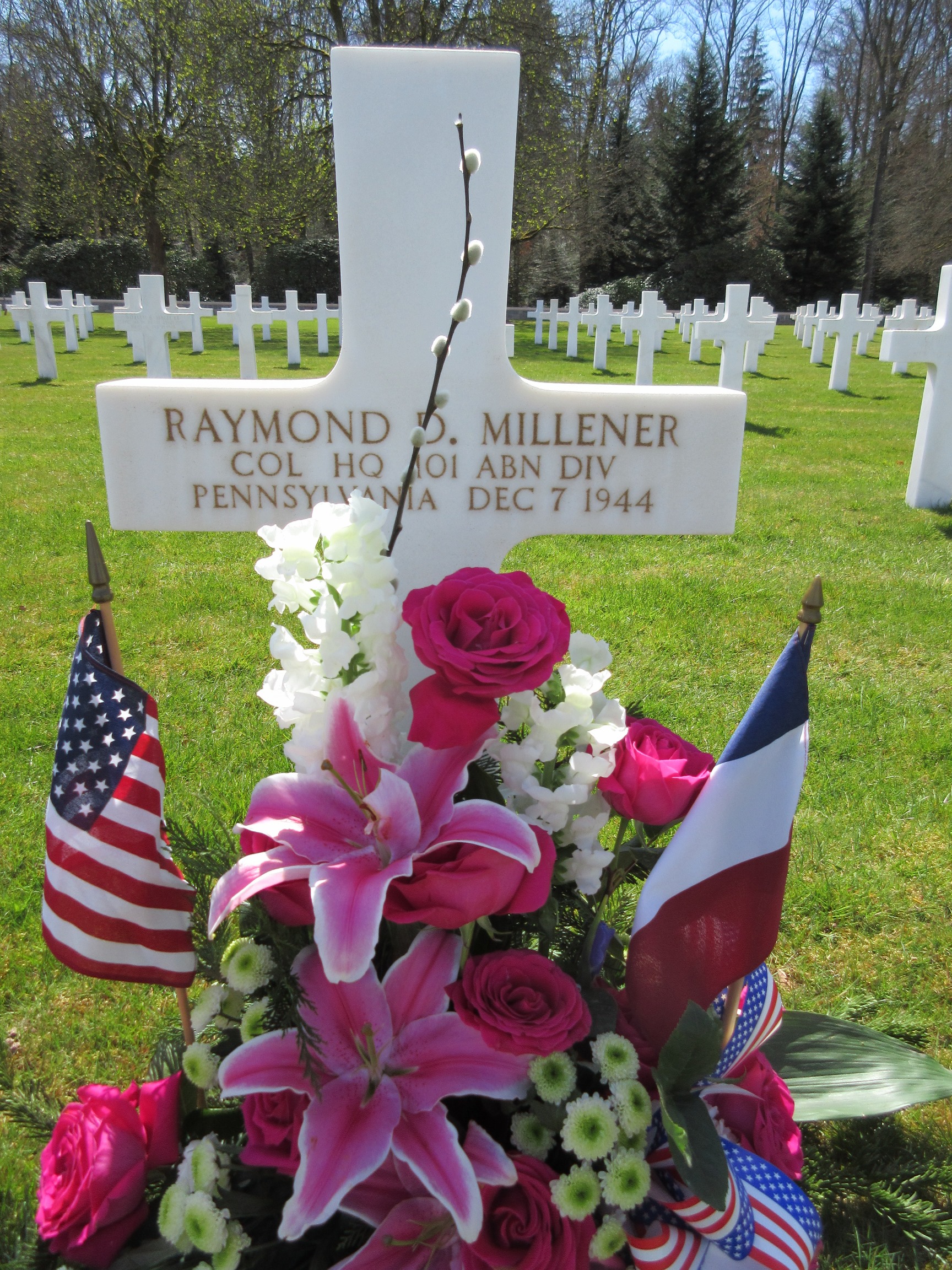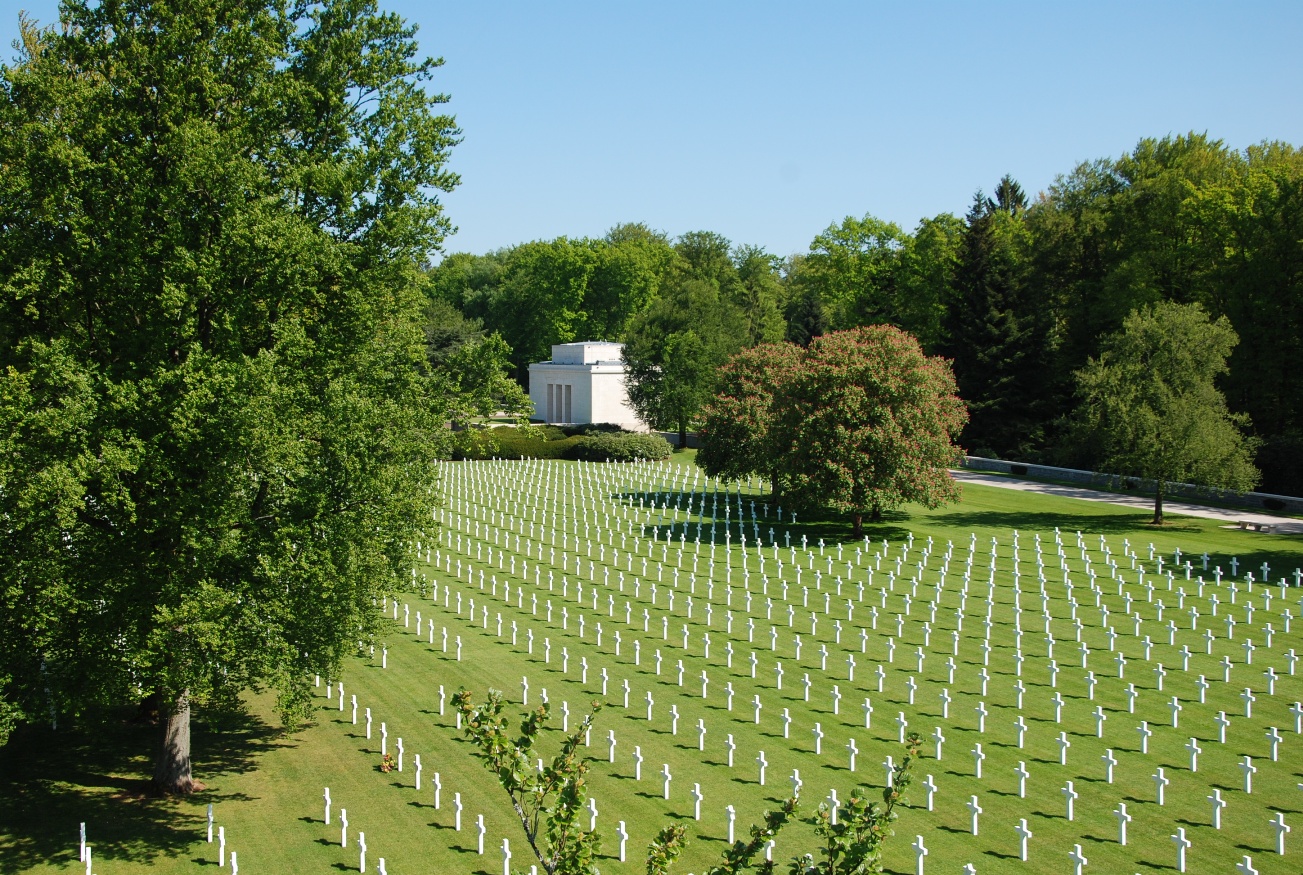Colonel Raymond D. Millener DIS
Hometown: Williamsport Pennsylvania
Headquarters, 101st Airborne Division
Service #O-018140
Awards: Distinguished Service Cross, Legion of Merit, French Croix de Guerre, Purple Heart
Note: Colonel Milleners cause of death suicide by gunshot
Biography gleaned from www.westpointaog.org
Graduate United States Military Academy Class of 1930
Raymond Davis Millener was born at Williamsport, Pennsylvania, April 13, 1908. He was the youngest of three brothers, all of whom were destined to serve their country well during the critical days of World War II. The senior, George A. Millener, preceded his younger brother to the United States Military Academy, graduating in 1924. Seward Millener served in the Army with distinction during the war period. "Bud" Millener was from his earliest days reared with membership in the Corps of Cadets as his first major goal.
Upon his graduation in 1930, Lt. Millener was stationed at Fort Niagara. New York, with the 28th Infantry. He learned rapidly through the performance of those usual duties which are assigned to a young 2nd Lieutenant serving with troops. In the summer of 1932, he was ordered to Panama where he served until 1935. Part of this tour was spent with the Infantry at Fort Davis, and part as Assistant Provost Marshal of the Atlantic Sector with station at Fort De Lesseps. It was in Panama that Lt. Millener married Linda H. Mercer, a young woman of staunch Army tradition, and niece of the late General Campbell B. Hodges, with whom she was visiting at the time of her marriage. The young couple returned to the United States in June of 1935, Lt. Millener having been ordered to the Infantry School at Fort Benning, from which he graduated in 1936. He was assigned to France for language study prior to a tour as instructor at the Military Academy. Lt. Millener pursued his studies at the Sorbonne in Paris during the year 1936-1937 and reported to the Military Academy in August to assume his duties as an instructor in the Department of Modern Languages. A daughter, Virginia Hodges Millener, was born at West Point on April 13, 1941.
In June 1941, Captain Millener left West Point for duty with the Second Infantry Division at Fort Sam Houston, Texas. He commanded the 2nd Battalion, 9th Infantry, during maneuvers in Louisiana, with outstanding success. He was ordered to the Command and General Staff School as a student in February 1942. After graduation in May, he was assigned to the 356th Infantry, then being activated at Camp Carson, Colorado, where he was promoted to Major.
In December of 1942, Major Millener was assigned to the 101st Airborne Division, reporting to the unit at Fort Bragg, North Carolina. He served as Assistant Chief of Staff, 0-3, from that time until the latter part of June 1944, and was responsible in great part for the splendid training which eventually made itself apparent in the record of this fighting division. He bore a large share in the planning for the Division's participation in the Normandy invasion, working ever more tirelessly as D-Day approached. By then a Lt. Colonel, Millener was scheduled to go into Normandy by gilder, but at the last minute the available glider lift was reduced to the extent that he was directed to come in with his section by water on D+1. Colonel, Millener appealed from this decision, requesting that he be allowed to parachute, although he had never received any special parachute training. He pled with such urgency that the Division Commander reluctantly approved. Thus, his first jump was into the rugged combat of D-Day in Normandy.
Colonel, Millener plane apparently became lost. He landed miles from the designated drop zone, deep in enemy territory. He formed his little band of parachutists, picked up those of another plane that had likewise jumped in that area, and for the next five days fought his way back to the Division under circumstances which earned him the Distinguished Service Cross.
Later in talking of this episode to a close friend, Millener made an observation which can be long and well considered by any young officer. In substance his remarks were these: "I never before quite realized what it meant to be an officer. As the ugly realities of our situation slowly dawned on our little group, I found the men instinctively turning to me for the answers. It was not a verbal questioning but was evident in their eyes and attitude. There was no one I could turn to for advice. The answers had to be given and had to be the right ones". Few are privileged to meet this full test of combat leadership in such exemplary fashion as he did during the days that followed his landing.
Upon reaching the Division Command Post, he assumed his duties and worked at a tireless pace and under terrific strain during the initial phase of the invasion. He exhausted himself so completely that during the latter part of June he suffered a collapsed lung, which caused his evacuation. Millener rejoined the Division in August as Chief of Staff and at once plunged into the work of preparing for the next operation. His second combat jump was made near Zon, Holland from a plane that had been struck by flak and was burning fiercely. Millener was with the Division during the 72 days in which it was in contact with the enemy and under continuous shell fire from the high ground opposite its position in the flat dike country.
When the Division was relieved and sent to France to prepare for another airborne operation, Colonel Millener again plunged into the exacting task of rebuilding and reequipping the units. As he spoke French fluently, he was called upon at all hours to assist in numerous matters which normally would never have been brought his attention.
The long strain of more than one year of continuous hard work, little sleep, heavy pressure and combat, finally took its toll. Millener health broke and he died at Moumelon-le-Grande in France on December 7, 1944. The entire Division was stunned to learn of his death. He had come to be well known, loved and esteemed by officers and men alike. He had earned this status through his feats in Normandy, his combat jumps without prior training, his calmness under fire, and his constant concern for others. The unit, not the individual, was always "Bud's" primary consideration. He played a great part in the building of a Combat Division that was the first in the history of the United States Army to win a Presidential Citation. He spared himself not at all in order to accomplish what he felt to be required of an officer and a true West Pointer.
Citations:
Distinguished Service Cross
The President of the United States of America, authorized by Act of Congress, July 9, 1918, takes pleasure in presenting the Distinguished Service Cross to Lieutenant Colonel (General Staff Corps) Raymond Davis Millener (ASN: 0-18140), United States Army, for extraordinary heroism in connection with military operations against an armed enemy while serving as Operations Officer, 101st Airborne Division, in action against enemy forces on 6 June 1944, in France. Lieutenant Colonel Millener and his men were dropped 15 miles from the appointed drop zone. He assembled all the forces in the immediate vicinity and started toward the designated assembly area to join the main force. En route, the party encountered heavy enemy resistance. Despite the intense enemy fire, Lieutenant Colonel Millener repeatedly exposed himself in leading his men. Inspired by Lieutenant Colonel Millener's personal bravery and leadership, his small force successfully assaulted two machine gun positions and destroyed two enemy tanks and two enemy half-track vehicles. The gallantry and superior leadership displayed by Lieutenant Colonel Millener exemplify the highest traditions of the military forces of the United States and reflect great credit upon himself, the 101st Airborne Division, and the United States Army.
General Orders: Headquarters, First U.S. Army, General Orders No. 31 (July 1, 1944)
Action Date: 6-Jun-44 Service: Army
Rank: Lieutenant Colonel Company: Operations Officer
Division: 101st Airborne Division
Legion of Merit
(Citation Needed) - SYNOPSIS: Lieutenant Colonel (General Staff Corps) Raymond Davis Millener (ASN: 0-18140), United States Army, was awarded the Legion of Merit for exceptionally meritorious conduct in the performance of outstanding services to the Government of the United States as Operations Officer, 101st Airborne Division, in 1944.
General Orders: United States Military Academy Register of Graduates
Action Date: 1944 Service: Army Rank: Lieutenant Colonel
Colonel Raymond D. Millener DIS
Hometown: Williamsport Pennsylvania
Headquarters, 101st Airborne Division
Service #O-018140
Awards: Distinguished Service Cross, Legion of Merit, French Croix de Guerre, Purple Heart
Note: Colonel Milleners cause of death suicide by gunshot
Biography gleaned from www.westpointaog.org
Graduate United States Military Academy Class of 1930
Raymond Davis Millener was born at Williamsport, Pennsylvania, April 13, 1908. He was the youngest of three brothers, all of whom were destined to serve their country well during the critical days of World War II. The senior, George A. Millener, preceded his younger brother to the United States Military Academy, graduating in 1924. Seward Millener served in the Army with distinction during the war period. "Bud" Millener was from his earliest days reared with membership in the Corps of Cadets as his first major goal.
Upon his graduation in 1930, Lt. Millener was stationed at Fort Niagara. New York, with the 28th Infantry. He learned rapidly through the performance of those usual duties which are assigned to a young 2nd Lieutenant serving with troops. In the summer of 1932, he was ordered to Panama where he served until 1935. Part of this tour was spent with the Infantry at Fort Davis, and part as Assistant Provost Marshal of the Atlantic Sector with station at Fort De Lesseps. It was in Panama that Lt. Millener married Linda H. Mercer, a young woman of staunch Army tradition, and niece of the late General Campbell B. Hodges, with whom she was visiting at the time of her marriage. The young couple returned to the United States in June of 1935, Lt. Millener having been ordered to the Infantry School at Fort Benning, from which he graduated in 1936. He was assigned to France for language study prior to a tour as instructor at the Military Academy. Lt. Millener pursued his studies at the Sorbonne in Paris during the year 1936-1937 and reported to the Military Academy in August to assume his duties as an instructor in the Department of Modern Languages. A daughter, Virginia Hodges Millener, was born at West Point on April 13, 1941.
In June 1941, Captain Millener left West Point for duty with the Second Infantry Division at Fort Sam Houston, Texas. He commanded the 2nd Battalion, 9th Infantry, during maneuvers in Louisiana, with outstanding success. He was ordered to the Command and General Staff School as a student in February 1942. After graduation in May, he was assigned to the 356th Infantry, then being activated at Camp Carson, Colorado, where he was promoted to Major.
In December of 1942, Major Millener was assigned to the 101st Airborne Division, reporting to the unit at Fort Bragg, North Carolina. He served as Assistant Chief of Staff, 0-3, from that time until the latter part of June 1944, and was responsible in great part for the splendid training which eventually made itself apparent in the record of this fighting division. He bore a large share in the planning for the Division's participation in the Normandy invasion, working ever more tirelessly as D-Day approached. By then a Lt. Colonel, Millener was scheduled to go into Normandy by gilder, but at the last minute the available glider lift was reduced to the extent that he was directed to come in with his section by water on D+1. Colonel, Millener appealed from this decision, requesting that he be allowed to parachute, although he had never received any special parachute training. He pled with such urgency that the Division Commander reluctantly approved. Thus, his first jump was into the rugged combat of D-Day in Normandy.
Colonel, Millener plane apparently became lost. He landed miles from the designated drop zone, deep in enemy territory. He formed his little band of parachutists, picked up those of another plane that had likewise jumped in that area, and for the next five days fought his way back to the Division under circumstances which earned him the Distinguished Service Cross.
Later in talking of this episode to a close friend, Millener made an observation which can be long and well considered by any young officer. In substance his remarks were these: "I never before quite realized what it meant to be an officer. As the ugly realities of our situation slowly dawned on our little group, I found the men instinctively turning to me for the answers. It was not a verbal questioning but was evident in their eyes and attitude. There was no one I could turn to for advice. The answers had to be given and had to be the right ones". Few are privileged to meet this full test of combat leadership in such exemplary fashion as he did during the days that followed his landing.
Upon reaching the Division Command Post, he assumed his duties and worked at a tireless pace and under terrific strain during the initial phase of the invasion. He exhausted himself so completely that during the latter part of June he suffered a collapsed lung, which caused his evacuation. Millener rejoined the Division in August as Chief of Staff and at once plunged into the work of preparing for the next operation. His second combat jump was made near Zon, Holland from a plane that had been struck by flak and was burning fiercely. Millener was with the Division during the 72 days in which it was in contact with the enemy and under continuous shell fire from the high ground opposite its position in the flat dike country.
When the Division was relieved and sent to France to prepare for another airborne operation, Colonel Millener again plunged into the exacting task of rebuilding and reequipping the units. As he spoke French fluently, he was called upon at all hours to assist in numerous matters which normally would never have been brought his attention.
The long strain of more than one year of continuous hard work, little sleep, heavy pressure and combat, finally took its toll. Millener health broke and he died at Moumelon-le-Grande in France on December 7, 1944. The entire Division was stunned to learn of his death. He had come to be well known, loved and esteemed by officers and men alike. He had earned this status through his feats in Normandy, his combat jumps without prior training, his calmness under fire, and his constant concern for others. The unit, not the individual, was always "Bud's" primary consideration. He played a great part in the building of a Combat Division that was the first in the history of the United States Army to win a Presidential Citation. He spared himself not at all in order to accomplish what he felt to be required of an officer and a true West Pointer.
Citations:
Distinguished Service Cross
The President of the United States of America, authorized by Act of Congress, July 9, 1918, takes pleasure in presenting the Distinguished Service Cross to Lieutenant Colonel (General Staff Corps) Raymond Davis Millener (ASN: 0-18140), United States Army, for extraordinary heroism in connection with military operations against an armed enemy while serving as Operations Officer, 101st Airborne Division, in action against enemy forces on 6 June 1944, in France. Lieutenant Colonel Millener and his men were dropped 15 miles from the appointed drop zone. He assembled all the forces in the immediate vicinity and started toward the designated assembly area to join the main force. En route, the party encountered heavy enemy resistance. Despite the intense enemy fire, Lieutenant Colonel Millener repeatedly exposed himself in leading his men. Inspired by Lieutenant Colonel Millener's personal bravery and leadership, his small force successfully assaulted two machine gun positions and destroyed two enemy tanks and two enemy half-track vehicles. The gallantry and superior leadership displayed by Lieutenant Colonel Millener exemplify the highest traditions of the military forces of the United States and reflect great credit upon himself, the 101st Airborne Division, and the United States Army.
General Orders: Headquarters, First U.S. Army, General Orders No. 31 (July 1, 1944)
Action Date: 6-Jun-44 Service: Army
Rank: Lieutenant Colonel Company: Operations Officer
Division: 101st Airborne Division
Legion of Merit
(Citation Needed) - SYNOPSIS: Lieutenant Colonel (General Staff Corps) Raymond Davis Millener (ASN: 0-18140), United States Army, was awarded the Legion of Merit for exceptionally meritorious conduct in the performance of outstanding services to the Government of the United States as Operations Officer, 101st Airborne Division, in 1944.
General Orders: United States Military Academy Register of Graduates
Action Date: 1944 Service: Army Rank: Lieutenant Colonel
Gravesite Details
Entered the Service from Pennsylvania.
Family Members
Other Records
Sponsored by Ancestry
Advertisement
Advertisement
